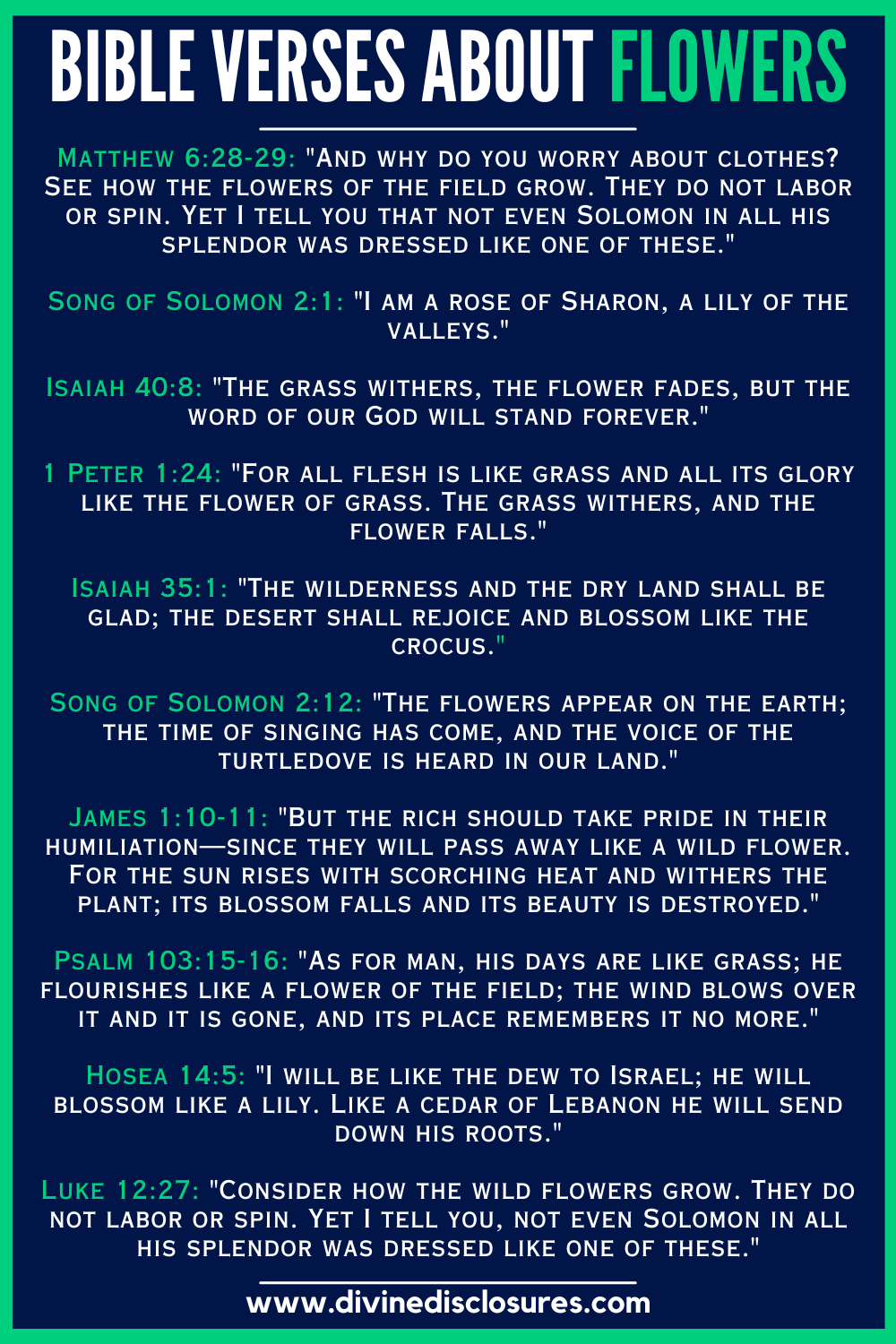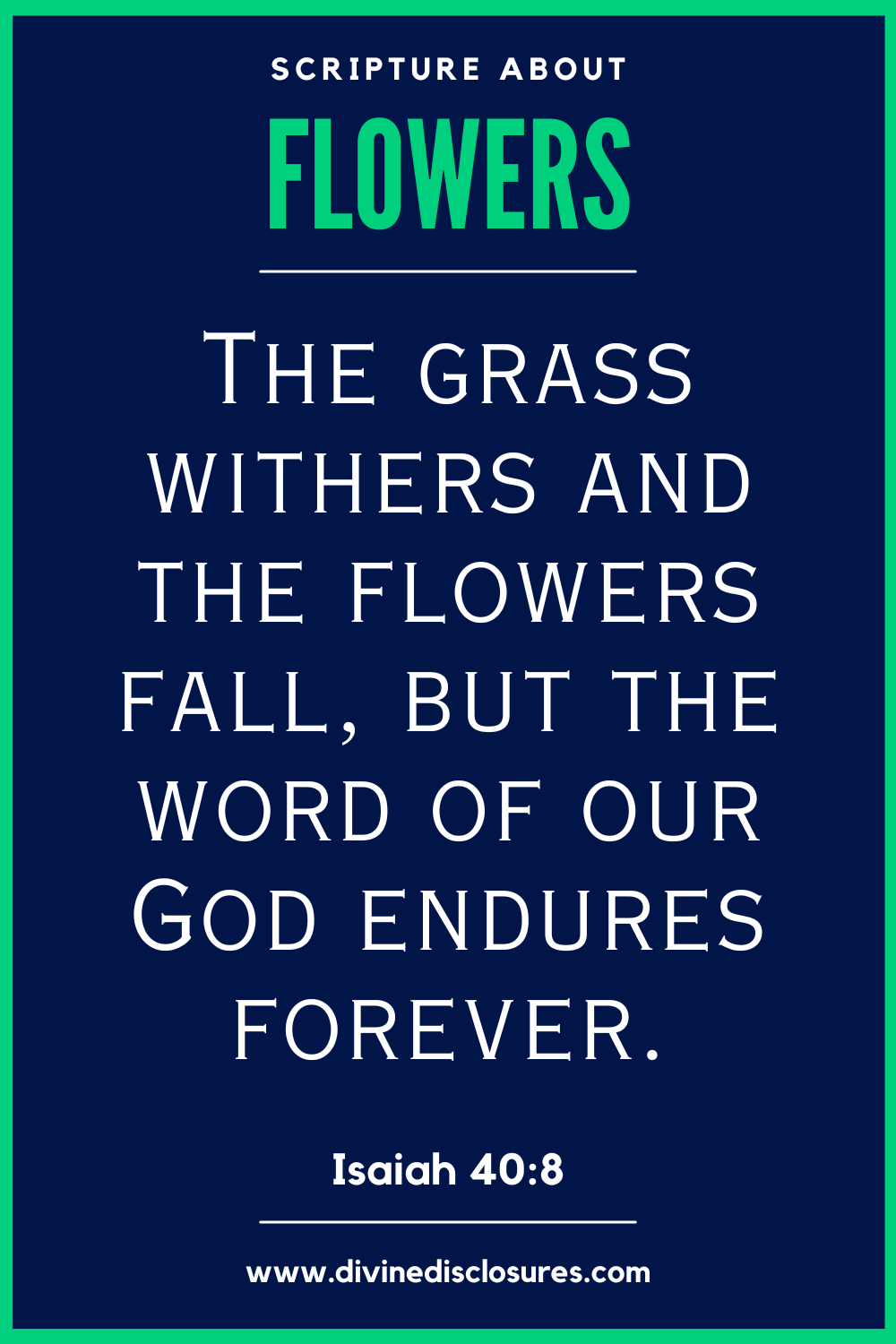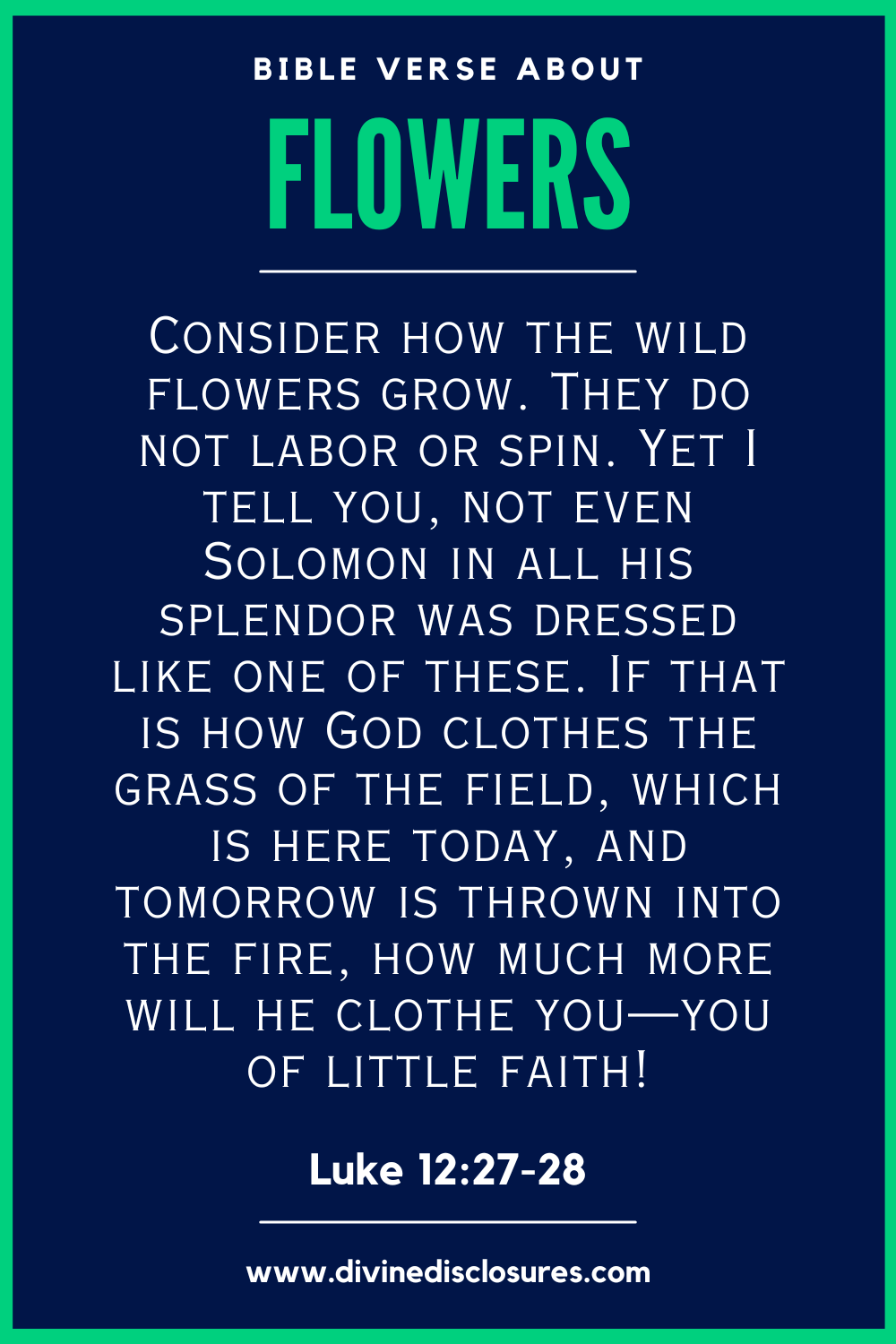Flowers, with their vibrant colors and delicate petals, are a symbol of beauty, joy, and renewal. The Bible, a book filled with imagery and symbolism, often uses flowers to represent themes of growth, purity, and the enduring love of God.
This article, “Bible Verses About Flowers,” explores a collection of scriptures that highlight the significance of flowers in the context of faith. Here, we’ll delve into verses that:
- Symbolize the beauty and fragility of life.
- Represent the purity and innocence of faith.
- Highlight the power of God’s creation and His love for the natural world.
Let the words of scripture guide you as you appreciate the beauty of flowers and their deeper spiritual meaning. Through these verses, may you find a renewed connection to nature and a deeper appreciation for the wonders of God’s creation.
Table of Contents
Flowers in the Bible: A Theological Exploration
Flowers in the Bible emerge as delicate yet profound symbols, weaving together themes of beauty, transience, and divine providence. While not as prominently featured as other natural elements, flowers in the Bible serve as powerful metaphors, offering insights into God’s character, His creation, and the spiritual truths that permeate our existence. From the fertile plains of Israel to the poetic imagery of the Psalms and the teachings of Jesus, flowers beckon us to consider the deeper spiritual realities they represent.
The Creation and Beauty of Flowers
The biblical narrative of creation, while not explicitly mentioning flowers, hints at their origin in the phrase, “And God said, ‘Let the earth sprout vegetation, plants yielding seed, and fruit trees bearing fruit in which is their seed, each according to its kind, on the earth.’ And it was so” (Genesis 1:11). This divine command encompasses the vast array of plant life, including the myriad flowers that adorn our world.
The beauty of flowers serves as a testament to God’s creative genius and His desire to infuse the world with wonder and delight. As we behold the intricate designs, vibrant colors, and delicate fragrances of flowers, we are reminded of the Psalmist’s declaration, “The heavens declare the glory of God, and the sky above proclaims his handiwork” (Psalm 19:1). Flowers, in their silent beauty, join this cosmic chorus, praising their Creator through their very existence.
Flowers as Symbols of Divine Providence
One of the most famous references to flowers in the Bible comes from Jesus’ Sermon on the Mount, where He uses lilies as an illustration of God’s providential care:
“Consider the lilies of the field, how they grow: they neither toil nor spin, yet I tell you, even Solomon in all his glory was not arrayed like one of these. But if God so clothes the grass of the field, which today is alive and tomorrow is thrown into the oven, will he not much more clothe you, O you of little faith?” (Matthew 6:28-30)
In this powerful teaching, Jesus draws our attention to the effortless beauty of wildflowers, contrasting their splendor with the opulence of King Solomon. The lilies, adorned by God’s hand alone, surpass even the finest human craftsmanship. This imagery serves as a poignant reminder of God’s attentive care for His creation and His promise to provide for His children.
The Transience of Flowers and Human Life
While flowers are celebrated for their beauty, they also serve as potent symbols of the brevity of life. The prophet Isaiah draws this parallel explicitly:
“A voice says, ‘Cry!’ And I said, ‘What shall I cry?’ All flesh is grass, and all its beauty is like the flower of the field. The grass withers, the flower fades when the breath of the Lord blows on it; surely the people are grass. The grass withers, the flower fades, but the word of our God will stand forever.” (Isaiah 40:6-8)
This passage juxtaposes the fleeting nature of human life with the eternal constancy of God’s word. Like flowers that bloom for a season and then wither, our mortal existence is transient. Yet, this sobering reality is balanced by the hope found in the enduring nature of God’s promises.
The Apostle James echoes this theme, exhorting believers to humility by reminding them of life’s brevity: “For the sun rises with its scorching heat and withers the grass; its flower falls, and its beauty perishes. So also will the rich man fade away in the midst of his pursuits” (James 1:11).
Flowers in the Song of Solomon
The Song of Solomon, a poetic celebration of love, is replete with floral imagery. The beloved is compared to various flowers, emphasizing her beauty and desirability:
“I am a rose of Sharon, a lily of the valleys.” (Song of Solomon 2:1) “His cheeks are like beds of spices, yielding fragrance. His lips are lilies, dripping liquid myrrh.” (Song of Solomon 5:13)
These sensual descriptions not only paint a vivid picture of physical beauty but also hint at the spiritual intimacy between God and His people, foreshadowing the deep love Christ has for His church.
The Promise of Resurrection
While flowers often symbolize transience, they also carry the promise of renewal and resurrection. The cycle of dormancy and blooming serves as a natural metaphor for the Christian hope of resurrection. The Apostle Paul draws on this imagery when discussing the resurrection body:
“But someone will ask, ‘How are the dead raised? With what kind of body do they come?’ You foolish person! What you sow does not come to life unless it dies. And what you sow is not the body that is to be, but a bare kernel, perhaps of wheat or of some other grain.” (1 Corinthians 15:35-37)
Just as a seed must be buried before it can sprout into new life, so too must our mortal bodies be laid to rest before being raised in glory. The flowering plant that emerges from the seemingly dead seed is a powerful reminder of the transformation promised to believers in Christ.
Flowers in the Bible and Their Meaning
Flowers in the Bible, though not always in the forefront, offer a wealth of spiritual truths. They remind us of God’s creative beauty, His providential care, the brevity of life, the depth of love, and the promise of resurrection. As we encounter flowers in our daily lives, may we be reminded of these profound biblical themes.
Let us, like the lilies of the field, trust in God’s provision and reflect His beauty in our lives. May we recognize the fleeting nature of our earthly existence and set our hope on the eternal promises of God. And as we witness the miracle of flowers blooming from dormant bulbs or seeds, may our hearts be stirred with the hope of resurrection, anticipating the day when we, too, shall be raised in glory.
In a world often marked by ugliness and decay, flowers stand as silent witnesses to the enduring beauty of God’s creation and the profound spiritual truths woven into the very fabric of nature. May we have eyes to see and hearts to perceive the divine messages whispered through these delicate yet profound creations of our loving Creator.
The Rich Symbolism of Flowers in the Bible
As already mentioned, within Scripture, flowers serve as vibrant threads, weaving together divine truths with the beauty of creation. These delicate yet profound symbols offer us glimpses into God’s character, His promises, and the spiritual realities that surround us. Let’s explore the rich symbolism of some important flowers in the Bible, drawing insights that can nourish our faith and deepen our understanding of God’s Word.
1. Lily in the Bible (שׁוּשַׁן, Shoshanah)
The lily, mentioned multiple times in Scripture, symbolizes purity, beauty, and the transient nature of earthly life.
“I am the rose of Sharon, and the lily of the valleys.” (Song of Solomon 2:1, KJV)
Christ is often associated with the lily, representing His perfect purity and unparalleled beauty. In Matthew 6:28-29, Jesus uses lilies to illustrate God’s care for His creation:
“Consider the lilies of the field, how they grow; they toil not, neither do they spin: And yet I say unto you, That even Solomon in all his glory was not arrayed like one of these.”
This passage reminds us of God’s abundant provision and the futility of worry in light of His care.
2. Rose in the Bible (חֲבַצֶּלֶת, Chavatzelet)
While the exact translation is debated, the rose (or possibly a crocus) is mentioned in the Bible as a symbol of beauty and the blossoming of God’s people.
“The wilderness and the solitary place shall be glad for them; and the desert shall rejoice, and blossom as the rose.” (Isaiah 35:1, KJV)
This prophecy speaks of the restoration and flourishing of God’s people, pointing to the transformative power of His presence in our lives.
3. Almond in the Bible (שָׁקֵד, Shaqed)
The almond tree, with its early blossoms, symbolizes God’s watchfulness and the swift fulfillment of His promises.
“Moreover the word of the Lord came unto me, saying, Jeremiah, what seest thou? And I said, I see a rod of an almond tree. Then said the Lord unto me, Thou hast well seen: for I will hasten my word to perform it.” (Jeremiah 1:11-12, KJV)
The almond’s quick blooming reminds us of God’s attentiveness to His word and His people.
4. Hyssop in the Bible (אֵזוֹב, Ezov)
Though not a flower in the traditional sense, hyssop is a significant plant in Scripture, symbolizing purification and cleansing.
“Purge me with hyssop, and I shall be clean: wash me, and I shall be whiter than snow.” (Psalm 51:7, KJV)
Hyssop was used in Passover rituals and in cleansing ceremonies, foreshadowing the purifying blood of Christ.
5. Myrrh in the Bible (מֹר, Mor)
While primarily known for its aromatic resin, myrrh produces small white flowers. It symbolizes suffering, death, and purification.
“All thy garments smell of myrrh, and aloes, and cassia, out of the ivory palaces, whereby they have made thee glad.” (Psalm 45:8, KJV)
Myrrh’s use in embalming and its bitter taste reflect the sufferings of Christ and the bitterness of sin.
6. Mandrake in the Bible (דּוּדָאִים, Dudaim)
The mandrake, with its distinctive purple flowers, symbolizes love and fertility in Scripture.
“And Reuben went in the days of wheat harvest, and found mandrakes in the field, and brought them unto his mother Leah.” (Genesis 30:14, KJV)
This account reflects the ancient belief in the mandrake’s properties, while spiritually pointing to God as the true source of fruitfulness.
7. Saffron in the Bible (כַּרְכֹּם, Karkom)
Mentioned in Song of Solomon, saffron symbolizes value and the sweetness of love.
“Spikenard and saffron; calamus and cinnamon, with all trees of frankincense; myrrh and aloes, with all the chief spices.” (Song of Solomon 4:14, KJV)
Its rarity and cost remind us of the preciousness of our relationship with God.
8. Flax in the Bible (פִּשְׁתָּה, Pishtah)
While primarily cultivated for its fibers, flax produces delicate blue flowers. It symbolizes industry and the judgment of God.
“The flax and the barley was smitten: for the barley was in the ear, and the flax was bolled.” (Exodus 9:31, KJV)
The destruction of flax in the plagues of Egypt demonstrates God’s power over nature and human industry.
9. Pomegranate in the Bible (רִמּוֹן, Rimmon)
Though technically a fruit, the pomegranate’s vibrant red flowers symbolize fruitfulness, abundance, and the richness of God’s blessings.
“And beneath upon the hem of it thou shalt make pomegranates of blue, and of purple, and of scarlet, round about the hem thereof; and bells of gold between them round about.” (Exodus 28:33, KJV)
The inclusion of pomegranates in priestly garments signifies the fullness of God’s provision and the beauty of His holiness.
10. Caper in the Bible (אֲבִיּוֹנָה, Aviyonah)
The caper bush, with its delicate white flowers, is mentioned in Ecclesiastes as a symbol of the diminishing desires of old age.
“When men are afraid of heights and of dangers in the streets; when the almond tree blossoms and the grasshopper drags itself along and desire no longer is stirred. Then man goes to his eternal home and mourners go about the streets.” (Ecclesiastes 12:5, NIV)
This poetic description uses the caper’s stimulant properties to illustrate the fading of earthly appetites as one approaches eternity.
Spiritual Meaning of Flowers in the Bible
The flowers mentioned in Scripture, from the majestic lily to the humble hyssop, serve as powerful reminders of God’s creativity, His care for creation, and the spiritual truths He desires to impart to us. As we consider these floral symbols, may we be drawn into a deeper appreciation of God’s Word and the beauty of His divine plan.
Let us, like the flowers of the field, turn our faces toward the Son, drawing nourishment from His presence and reflecting His glory in the unique ways He has designed us. For in Christ, we find the fulfillment of every symbol and the blossoming of eternal life.
Love the Word? Live the Word
Join Daniel Niranjan’s inner circle who receive powerful Bible insights, exclusive offers on transformative Christian resources, and Spirit-filled reflections to fuel your faith and deepen your walk with God.
Join 12,000+ believers receiving encouragement
Best Bible Verses About Flowers
Here are 20 of the best Bible verses about flowers:
- Matthew 6:28-29: “And why do you worry about clothes? See how the flowers of the field grow. They do not labor or spin. Yet I tell you that not even Solomon in all his splendor was dressed like one of these.”
- Song of Solomon 2:1: “I am a rose of Sharon, a lily of the valleys.”
- Isaiah 40:8: “The grass withers, the flower fades, but the word of our God will stand forever.”
- 1 Peter 1:24: “For all flesh is like grass and all its glory like the flower of grass. The grass withers, and the flower falls.”
- Isaiah 35:1: “The wilderness and the dry land shall be glad; the desert shall rejoice and blossom like the crocus.”
- Song of Solomon 2:12: “The flowers appear on the earth; the time of singing has come, and the voice of the turtledove is heard in our land.”
- James 1:10-11: “But the rich should take pride in their humiliation—since they will pass away like a wild flower. For the sun rises with scorching heat and withers the plant; its blossom falls and its beauty is destroyed.”
- Psalm 103:15-16: “As for man, his days are like grass; he flourishes like a flower of the field; the wind blows over it and it is gone, and its place remembers it no more.”
- Hosea 14:5: “I will be like the dew to Israel; he will blossom like a lily. Like a cedar of Lebanon he will send down his roots.”
- Luke 12:27: “Consider how the wild flowers grow. They do not labor or spin. Yet I tell you, not even Solomon in all his splendor was dressed like one of these.”
- Job 14:2: “He springs up like a flower and withers away; like a fleeting shadow, he does not endure.”
- Isaiah 28:1: “Woe to that wreath, the pride of Ephraim’s drunkards, to the fading flower, his glorious beauty, set on the head of a fertile valley— to that city, the pride of those laid low by wine!”
- Nahum 1:4: “He rebukes the sea and dries it up; he makes all the rivers run dry. Bashan and Carmel wither and the blossoms of Lebanon fade.”
- 1 Kings 6:18: “The inside of the temple was cedar, carved with gourds and open flowers. Everything was cedar; no stone was to be seen.”
- Psalm 72:16: “May there be abundance of grain in the land; on the tops of the mountains may it wave; may its fruit be like Lebanon; and may people blossom in the cities like the grass of the field!”
- Isaiah 18:5: “For before the harvest, when the blossom is gone and the flower becomes a ripening grape, he will cut off the shoots with pruning knives, and cut down and take away the spreading branches.”
- Psalm 92:12-13: “The righteous will flourish like a palm tree, they will grow like a cedar of Lebanon; planted in the house of the Lord, they will flourish in the courts of our God.”
- Zechariah 10:1: “Ask the Lord for rain in the springtime; it is the Lord who sends the thunderstorms. He gives showers of rain to all people, and plants of the field to everyone.”
- Deuteronomy 33:14: “With the best the sun brings forth and the finest the moon can yield.”
- Job 8:16-17: “They are like a well-watered plant in the sunshine, spreading its shoots over the garden; it entwines its roots around a pile of rocks and looks for a place among the stones.
These scriptures about flowers beautifully illustrate the fleeting beauty of flowers and how they often symbolize life, grace, and the care of God.

Bible Verses About Flowers Blooming
- Song of Solomon 2:12: “The flowers appear on the earth; the time of singing has come, and the voice of the turtledove is heard in our land.”
- Isaiah 35:1-2: “The wilderness and the dry land shall be glad; the desert shall rejoice and blossom like the crocus; it shall blossom abundantly and rejoice with joy and singing. The glory of Lebanon shall be given to it, the majesty of Carmel and Sharon. They shall see the glory of the Lord, the majesty of our God.”
- Isaiah 27:6: “In days to come, Jacob shall take root, Israel shall blossom and put forth shoots and fill the whole world with fruit.”
- Hosea 14:5-6: “I will be like the dew to Israel; he shall blossom like the lily; he shall take root like the trees of Lebanon; his shoots shall spread out; his beauty shall be like the olive, and his fragrance like Lebanon.”
- Psalm 72:16: “May there be abundance of grain in the land; on the tops of the mountains may it wave; may its fruit be like Lebanon; and may people blossom in the cities like the grass of the field!”
Bible Verses About Flowers and Spring
- Song of Solomon 2:11-13: “See! The winter is past; the rains are over and gone. Flowers appear on the earth; the season of singing has come, the cooing of doves is heard in our land. The fig tree forms its early fruit; the blossoming vines spread their fragrance. Arise, come, my darling; my beautiful one, come with me.”
- Isaiah 55:10-11: “As the rain and the snow come down from heaven, and do not return to it without watering the earth and making it bud and flourish, so that it yields seed for the sower and bread for the eater, so is my word that goes out from my mouth: It will not return to me empty, but will accomplish what I desire and achieve the purpose for which I sent it.”
- Zechariah 10:1: “Ask the Lord for rain in the springtime; it is the Lord who sends the thunderstorms. He gives showers of rain to all people, and plants of the field to everyone.”
- Joel 2:22: “Do not be afraid, you wild animals, for the pastures in the wilderness are becoming green. The trees are bearing their fruit; the fig tree and the vine yield their riches.”
Bible Verses About Flowers and Nature
- Matthew 6:28-30: “And why do you worry about clothes? See how the flowers of the field grow. They do not labor or spin. Yet I tell you that not even Solomon in all his splendor was dressed like one of these. If that is how God clothes the grass of the field, which is here today and tomorrow is thrown into the fire, will he not much more clothe you—you of little faith?”
- Psalm 103:15-16: “As for man, his days are like grass; he flourishes like a flower of the field; the wind passes over it, and it is gone, and its place knows it no more.”
- James 1:10-11: “But the rich should take pride in their humiliation—since they will pass away like a wildflower. For the sun rises with scorching heat and withers the plant; its blossom falls and its beauty is destroyed. In the same way, the rich will fade away even while they go about their business.”
- Isaiah 40:6-8: “A voice says, ‘Cry out.’ And I said, ‘What shall I cry?’ ‘All people are like grass, and all their faithfulness is like the flowers of the field. The grass withers and the flowers fall, because the breath of the Lord blows on them. Surely the people are grass. The grass withers and the flowers fall, but the word of our God endures forever.’”
- Job 14:2: “They spring up like flowers and wither away; like fleeting shadows, they do not endure.”
- 1 Peter 1:24: “‘All people are like grass, and all their glory is like the flowers of the field; the grass withers and the flowers fall.’”
Bible Verses About Flowers of the Field
- Matthew 6:28-30: “And why do you worry about clothes? See how the flowers of the field grow. They do not labor or spin. Yet I tell you that not even Solomon in all his splendor was dressed like one of these. If that is how God clothes the grass of the field, which is here today and tomorrow is thrown into the fire, will he not much more clothe you—you of little faith?”
- Luke 12:27-28: “Consider how the wild flowers grow. They do not labor or spin. Yet I tell you, not even Solomon in all his splendor was dressed like one of these. If that is how God clothes the grass of the field, which is here today, and tomorrow is cast into the oven; how much more will He clothe you, O you of little faith?”
- Isaiah 40:6-8: “A voice says, ‘Cry out.’ And I said, ‘What shall I cry?’ ‘All people are like grass, and all their faithfulness is like the flowers of the field. The grass withers and the flowers fall, because the breath of the Lord blows on them. Surely the people are grass. The grass withers and the flowers fall, but the word of our God endures forever.’”
- Psalm 103:15: “As for man, his days are like grass; he flourishes like a flower of the field.”
- James 1:10-11: “But the rich should take pride in their humiliation—since they will pass away like a wildflower. For the sun rises with scorching heat and withers the plant; its blossom falls and its beauty is destroyed. In the same way, the rich will fade away even while they go about their business.”
Bible Verses About Flowers and Life
- 1 Peter 1:24-25: “‘All people are like grass, and all their glory is like the flowers of the field; the grass withers and the flowers fall, but the word of the Lord endures forever.’ And this is the word that was preached to you.”
- Isaiah 40:6-8: “A voice says, ‘Cry out.’ And I said, ‘What shall I cry?’ ‘All people are like grass, and all their faithfulness is like the flowers of the field. The grass withers and the flowers fall, because the breath of the Lord blows on them. Surely the people are grass. The grass withers and the flowers fall, but the word of our God endures forever.’”
- Psalm 103:15-16: “As for man, his days are like grass; he flourishes like a flower of the field; the wind passes over it, and it is gone, and its place knows it no more.”
- Job 14:2: “They spring up like flowers and wither away; like fleeting shadows, they do not endure.”
- James 1:10-11: “But the rich should take pride in their humiliation—since they will pass away like a wildflower. For the sun rises with scorching heat and withers the plant; its blossom falls and its beauty is destroyed. In the same way, the rich will fade away even while they go about their business.”
- Psalm 90:5-6: “You sweep people away in the sleep of death—they are like the new grass of the morning: In the morning it springs up new, but by evening it is dry and withered.”
Bible Verses About Flowers and Plants
- Genesis 1:11-12: “Then God said, ‘Let the land produce vegetation: seed-bearing plants and trees on the land that bear fruit with seed in it, according to their various kinds.’ And it was so. The land produced vegetation: plants bearing seed according to their kinds and trees bearing fruit with seed in it according to their kinds. And God saw that it was good.”
- Psalm 104:14-15: “He makes grass grow for the cattle, and plants for people to cultivate—bringing forth food from the earth: wine that gladdens human hearts, oil to make their faces shine, and bread that sustains their hearts.”
- Job 14:2: “They spring up like flowers and wither away; like fleeting shadows, they do not endure.”
- Isaiah 40:6-8: “A voice says, ‘Cry out.’ And I said, ‘What shall I cry?’ ‘All people are like grass, and all their faithfulness is like the flowers of the field. The grass withers and the flowers fall, because the breath of the Lord blows on them. Surely the people are grass. The grass withers and the flowers fall, but the word of our God endures forever.’”
- Song of Solomon 2:12: “The flowers appear on the earth; the time of singing has come, and the voice of the turtledove is heard in our land.”
- Matthew 6:28-30: “And why do you worry about clothes? See how the flowers of the field grow. They do not labor or spin. Yet I tell you that not even Solomon in all his splendor was dressed like one of these. If that is how God clothes the grass of the field, which is here today and tomorrow is thrown into the fire, will he not much more clothe you—you of little faith?”
Bible Verses About Flowers and Gardens
- Song of Solomon 6:2-3: “My beloved has gone down to his garden, to the beds of spices, to browse in the gardens and to gather lilies. I am my beloved’s and my beloved is mine; he browses among the lilies.”
- Isaiah 58:11: “The Lord will guide you always; he will satisfy your needs in a sun-scorched land and will strengthen your frame. You will be like a well-watered garden, like a spring whose waters never fail.”
- Jeremiah 31:12: “They will come and shout for joy on the heights of Zion; they will rejoice in the bounty of the Lord—the grain, the new wine and the olive oil, the young of the flocks and herds. They will be like a well-watered garden, and they will sorrow no more.”
- Song of Solomon 4:16: “Awake, north wind, and come, south wind! Blow on my garden, that its fragrance may spread everywhere. Let my beloved come into his garden and taste its choice fruits.”
- Genesis 2:8-9: “Now the Lord God had planted a garden in the east, in Eden; and there he put the man he had formed. The Lord God made all kinds of trees grow out of the ground—trees that were pleasing to the eye and good for food. In the middle of the garden were the tree of life and the tree of the knowledge of good and evil.”
Bible Verses About Flowers and Love
- Song of Solomon 2:1-2: “I am a rose of Sharon, a lily of the valleys. Like a lily among thorns is my darling among the young women.”
- Hosea 14:5-6: “I will be like the dew to Israel; he will blossom like a lily. Like a cedar of Lebanon he will send down his roots; his young shoots will grow. His splendor will be like an olive tree, his fragrance like a cedar of Lebanon.”
- Song of Solomon 7:12-13: “Let us go early to the vineyards to see if the vines have budded, if their blossoms have opened, and if the pomegranates are in bloom—there I will give you my love. The mandrakes send out their fragrance, and at our door is every delicacy, both new and old, that I have stored up for you, my beloved.”
Short Bible Verses About Flowers
- Isaiah 40:8: The grass withers, the flower fades.
- Matthew 6:28: Consider the lilies of the field.
- Song of Solomon 2:1: I am the rose of Sharon.
- Psalm 103:15: Man is like grass, a flower of the field.
- Isaiah 35:1: The desert shall rejoice, and blossom.
- Job 14:2: He comes out like a flower.
- Luke 12:27: Consider the lilies how they grow.
- Song of Solomon 2:12: The flowers appear on the earth.
- James 1:10: The rich in his humiliation, a flower of the field.
- Isaiah 5:24: Woe to those who put bitter for sweet.
Scripture about Flowers: Isaiah 40:8
This is a profound scripture about flowers:
“The grass withers and the flowers fall, but the word of our God endures forever.” (Isaiah 40:8, NIV)
This scripture about flowers contrasts the temporary nature of earthly beauty with the eternal nature of God’s word. Isaiah 40:8 uses the image of withering grass and falling flowers to illustrate the fleeting nature of worldly things. This scripture about flowers reminds us that while the beauty of nature is transient, God’s truth and promises are everlasting, encouraging us to place our trust in what is eternal rather than what is temporary.

Scripture about Flowers of the Field: Matthew 6:28-29
This is a beautiful scripture about flowers of the field:
“And why do you worry about clothes? See how the flowers of the field grow. They do not labor or spin. Yet I tell you that not even Solomon in all his splendor was dressed like one of these.” (Matthew 6:28-29, NIV)
This scripture about flowers of the field is part of Jesus’ teaching on worry and trust in God’s provision. Matthew 6:28-29 uses the example of wildflowers to illustrate God’s care for His creation. This scripture about flowers of the field emphasizes that if God clothes the flowers in such beauty, how much more will He provide for His children? It encourages us to trust in God’s provision and to appreciate the simple, natural beauty around us.
Scripture on Flowers: Song of Solomon 2:12
This is a poetic scripture on flowers:
“Flowers appear on the earth; the season of singing has come, the cooing of doves is heard in our land.” (Song of Solomon 2:12, NIV)
This scripture on flowers paints a vivid picture of springtime, with blooming flowers and the sounds of nature. Song of Solomon 2:12 uses the image of flowers to symbolize new beginnings, beauty, and the awakening of love. This scripture on flowers invites us to appreciate the beauty of nature and to recognize the seasons of renewal and joy in our own lives.
Bible Verse on Flowers: 1 Peter 1:24
This is a reflective Bible verse on flowers:
“For, ‘All people are like grass, and all their glory is like the flowers of the field; the grass withers and the flowers fall,'” (1 Peter 1:24, NIV)
This Bible verse on flowers echoes Isaiah’s sentiment about the transient nature of earthly things. 1 Peter 1:24 compares human life and achievements to grass and flowers, emphasizing their temporary nature. This Bible verse on flowers reminds us of our mortality and the fleeting nature of worldly glory, encouraging us to focus on eternal values and spiritual growth rather than temporary earthly pursuits.
Bible Verse about Flowers: Isaiah 35:1-2
This is an uplifting Bible verse about flowers:
“The desert and the parched land will be glad; the wilderness will rejoice and blossom. Like the crocus, it will burst into bloom; it will rejoice greatly and shout for joy.” (Isaiah 35:1-2a, NIV)
This Bible verse about flowers uses the image of blooming flowers to symbolize hope, restoration, and God’s transformative power. Isaiah 35:1-2 paints a picture of joy and renewal, where even barren places burst into bloom. This Bible verse about flowers encourages us to have faith in God’s ability to bring beauty and life to seemingly hopeless situations.

Bible Verse about Flowers and Birds: Luke 12:27-28
This is a reassuring Bible verse about flowers and birds:
“Consider how the wild flowers grow. They do not labor or spin. Yet I tell you, not even Solomon in all his splendor was dressed like one of these. If that is how God clothes the grass of the field, which is here today, and tomorrow is thrown into the fire, how much more will he clothe you—you of little faith!” (Luke 12:27-28, NIV)
This Bible verse about flowers and birds uses the example of wildflowers to illustrate God’s care for His creation. Luke 12:27-28 emphasizes that if God provides so beautifully for flowers, which are temporary, He will certainly care for His children. This Bible verse about flowers and birds encourages us to trust in God’s provision and to recognize His care in the beauty of nature around us.
Looking Beyond Bible Verses about Flowers
As we conclude our exploration of Bible verses about flowers, remember, that these verses offer a reminder of the beauty, fragility, and fleeting nature of life. They also symbolize God’s love, care, and the promise of new beginnings.
Deepen Your Appreciation:
- Explore our “Bible Verses” section: Discover additional scriptures that celebrate nature, God’s creation, and the beauty of the world around us. You might also enjoy “This Outside Life.”
- Embrace the Power of Prayer: Visit our prayers section to find prayers for gratitude, appreciation, and connecting with nature.
- Share Your Journey:
- Prayer Request Page: Is there something specific in nature that you need prayer for? Share your requests on our prayer request page.
- Leave a Comment Below: Share your favorite flower-related verse or how nature has brought you closer to God.
Spread the Light:
- Share this article with others who appreciate the beauty of nature and the spiritual lessons it can teach.
- Consider a donation to Divine Disclosures to help us continue providing valuable resources and fostering a supportive online community.
May the Bible verses about flowers you’ve discovered inspire you to appreciate the beauty and wonder of the world around you. Remember, even in the smallest of flowers, we can find a reflection of God’s love and care. Let your heart be filled with gratitude for the beauty He has placed in our lives.









